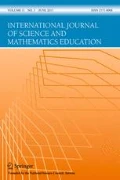ABSTRACT
This paper explores the potential impact of a national pilot initiative in England aimed at increasing and widening participation in advanced mathematical study through the creation of a new qualification for 16- to 18-year-olds. This proposed qualification pathway—Use of Mathematics—sits in parallel with long-established, traditional advanced level qualifications, what we call ‘traditional Mathematics’ herein. Traditional Mathematics is typically required for entry to mathematically demanding undergraduate programmes. The structure, pedagogy and assessment of Use of Mathematics is designed to better prepare students in the application of mathematics, and its development has surfaced some of the tensions between academic/pure and vocational/applied mathematics. Here, we explore what Use of Mathematics offers, but we also consider some of the objections to its introduction in order to explore aspects of the knowledge politics of mathematics education. Our evaluation of this curriculum innovation raises important issues for the mathematics education community as countries seek to increase the numbers of people that are well prepared to apply mathematics in science and technology-based higher education courses and work places.
Similar content being viewed by others
References
Apple, M. (1993). Official knowledge: Democratic education in a conservative age. London: Routledge.
Apple, M. (2004). Ideology and curriculum—3rd ed.. London: Routledge.
AQA (2010). Specifications for AS Use of Mathematics. Retrieved 1 September 2010 from http://store.aqa.org.uk/qual/pdf/AQA-5351-W-SP-10.PDF.
Cardella, M. E. (2008). Which mathematics should we teach engineering students? An empirically grounded case for a broad notion of mathematical thinking. Teaching Mathematics and its Applications, 27(3), 150–159.
Ernest, P. (1992). The national curriculum in mathematics: Political perspectives and implications. In M. Nickson & S. Lerman (Eds.), The social context of mathematics education: Theory and practice (pp. 33–61). London: South Bank Press.
Ernest, P. (2004). Relevance versus utility: Some ideas on what it means to know mathematics. In B. Clarke, D. M. Clarke, et al. (Eds.), Perspectives on learning and teaching mathematics (pp. 313–327). Goteborg: National Centre for Mathematics Education.
Gago, J. M. (2004). Increasing human resources for science and technology in Europe. Brussels: European Commission.
Gutstein, E. (2009). The politics of mathematics education in the United States: Dominant and counter agendas. In B. S. Greer, Mukhopadhyay, et al. (Eds.), Culturally Responsive Mathematics Education (pp. 137–164). Abingdon: Routledge.
Gueudet, G. (2008). Investigating the secondary–tertiary transition. Educational Studies in Mathematics, 67, 237–254.
Haighton, J., Haworth, A. & Wake, G. D. (2003a). AS: Use of maths, algebra & graphs. Cheltenham: Nelson Thornes.
Haighton, J., Haworth, A. & Wake, G. D. (2003b). AS: Use of maths, statistics. Cheltenham: Nelson Thornes.
Haighton, J., Haworth, A. & Wake, G. D. (2004). AS: Use of maths, calculus. Cheltenham: Nelson Thornes.
Hoyles, C., Noss, R., Kent, P. & Bakker, A. (2010). Improving mathematics at work: The need for techo-mathematical literacies. London: Routledge.
Matthews, A. & Pepper, D. (2007). Evaluation of participation in A level mathematics: Final report. London: Qualifications and Curriculum Authority.
National Academies (2007). Rising above the gathering storm: Energizing and employing America for a brighter future. Washington: National Academies Press.
Noyes, A. (2007). Mathematics counts…for what? Rethinking the mathematics curriculum in England. Philosophy of Mathematics Education, 21 September 2007 Online http://people.exeter.ac.uk/PErnest/
Restivo, S., & Sloan, D. (2007). The Sturm und Drang of mathematics: Casualties, consequences and contingencies in the math wars. Philosophy of Mathematics Education, 20 June 2007 Online http://people.exeter.ac.uk/PErnest/
Roberts, G. (2002). SET for success: The supply of people with science, technology, engineering and mathematics skills. London: Department for Education and Science.
Rocard, M. (2007). Science Education Now: A renewed pedagogy for the future of Europe. Brussels: European Commission.
Royal Society (2008). Science and mathematics education 14–19: A 'state of the nation' report on the participation and attainment of 14–19 year olds in science and mathematics in the UK. London: The Royal Society.
Schoenfeld, A. (2004). The math wars. Educational Policy, 18(1), 253–286.
Smith, A. (2004). Making mathematics count. London: The Stationery Office.
Steen, L. A. (2001). Data, shapes, symbols: Achieving balance in school mathematics. In L. A. Steen (Ed.), Mathematics and democracy: The case for quantitative literacy (pp. 53–74). Princeton: National Council on Education and the Disciplines.
Treffers, A. (1987). Three dimensions: A model of goal and theory description in mathematics instruction—The Wiskobas Project. Dordrecht: Reidel.
Van den Heuvel-Panhuizen, M. (2001) Realistic mathematics education as work in progress. Common Sense in Mathematics Education. Proceedings of the Netherlands and Taiwan Conference on Mathematics Education, (edited by Lin F.L.), Taipei, Taiwan.
Wake, G. (2005). Functional mathematics: More than “back to basics”. Nuffield Review of 14–19 Education and Training, pp. 1–11.
Wake, G. (2010). Transition: Looking sideways as well as forwards. Unpublished paper presented at the British Educational Research Association Annual Conference, Warwick, September 2010.
Williams, J. S., Wake, G., Black, L., Davis, P., Hernandez-Martinez, P., Hutcheson, G., Nicholson, S. (2008). TLRP Research Briefing No 38: Keeping open the door to mathematically demanding programmes in Further and Higher Education. Retrieved from http://www.lta.education.manchester.ac.uk/TLRP/Research%20Briefing.pdf.
Author information
Authors and Affiliations
Corresponding author
Rights and permissions
About this article
Cite this article
Noyes, A., Wake, G. & Drake, P. WIDENING AND INCREASING POST-16 MATHEMATICS PARTICIPATION: PATHWAYS, PEDAGOGIES AND POLITICS. Int J of Sci and Math Educ 9, 483–501 (2011). https://doi.org/10.1007/s10763-011-9281-4
Received:
Accepted:
Published:
Issue Date:
DOI: https://doi.org/10.1007/s10763-011-9281-4




